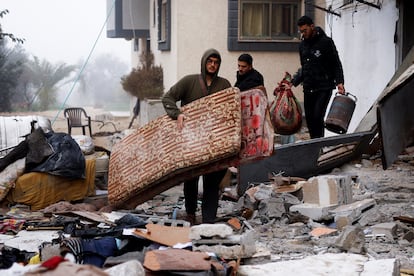Israel orders the evacuation of more than one million civilians in Rafah to ‘eliminate’ Hamas
Prime Minister Benjamin Netanyahu is ignoring calls from the international community, including the United States, to avoid the humanitarian disaster that a military incursion in the southern Gaza area would entail


Israel announced Friday a major move in the Gaza war. Prime Minister Benjamin Netanyahu has decided to move his troops into Rafah, at the southern tip of the Gaza Strip, in order to complete its occupation of the Palestinian enclave. The military operation would include the evacuation of more than one million people — over half of Gaza’s total population (some 2.3 million) —, the vast majority of whom were forcibly displaced from northern Gaza by Israeli forces and crowded into the area bordering Egypt.
“It is impossible to achieve the goal of the war of eliminating Hamas by leaving four Hamas battalions in Rafah,” Netanyahu’s office said in a statement Friday. “On the contrary, it is clear that intense activity in Rafah requires that civilians evacuate the areas of combat,” the text added. The prime minister has ordered the military and security officials to come up with a “combined plan” that includes both a mass evacuation of civilians and the destruction of Hamas’ forces in the area. This is a very complex task about which the statement does not provide any details.
For days, all eyes have been on Rafah, which could become a new battlefield in Israel’s war on Gaza. In defiance of the international community’s appeals, both at the diplomatic and humanitarian levels, Israeli troops have continued their air and artillery attacks on the densely crowded area, where civilians have been pushed to throughout the past four months of war. At least eight people, several from the same family, were killed by an Israeli bomb on Friday, according to local health authorities. Meanwhile, the military remains in neighboring Khan Yunis, a few miles further north and the focal point of the conflict in recent weeks.
Netanyahu’s announcement comes shortly after U.S. President Joe Biden said Thursday night that Israel’s conduct in the war has been “over the top.” Israel’s main international ally fears that the current humanitarian crisis will worsen and the number of civilian casualties will skyrocket if troops invade Rafah. The same fear has been expressed by the United Nations and different NGOs working on the ground.
The United States is also trying to put Netanyahu on the path to a ceasefire agreement with Hamas. Secretary of State Antony Blinken, who recently traveled to the region for the fifth time since October 7, left on Thursday without an agreement. Meanwhile, Egypt and Qatar are trying to keep negotiations alive by maintaining direct contact with Hamas in Cairo. Some Israeli analysts consider, in any case, that Netanyahu is trying to cover his back. On the one hand, he flatly rejected Hamas’s proposal for a truce and exchange of hostages for Palestinian prisoners and is keeping his government afloat thanks to ministers who act as his internal opposition, openly confronting the Biden administration. On the other hand, he is trying to keep the moderates in his administration on his side.
Behind Netanyahu’s decision on whether to make Rafah another Khan Younis, lies the issue of the release of the 136 hostages still in Gaza, whose return home is one of the pillars on which the ceasefire negotiations revolve.
Sign up for our weekly newsletter to get more English-language news coverage from EL PAÍS USA Edition
Tu suscripción se está usando en otro dispositivo
¿Quieres añadir otro usuario a tu suscripción?
Si continúas leyendo en este dispositivo, no se podrá leer en el otro.
FlechaTu suscripción se está usando en otro dispositivo y solo puedes acceder a EL PAÍS desde un dispositivo a la vez.
Si quieres compartir tu cuenta, cambia tu suscripción a la modalidad Premium, así podrás añadir otro usuario. Cada uno accederá con su propia cuenta de email, lo que os permitirá personalizar vuestra experiencia en EL PAÍS.
¿Tienes una suscripción de empresa? Accede aquí para contratar más cuentas.
En el caso de no saber quién está usando tu cuenta, te recomendamos cambiar tu contraseña aquí.
Si decides continuar compartiendo tu cuenta, este mensaje se mostrará en tu dispositivo y en el de la otra persona que está usando tu cuenta de forma indefinida, afectando a tu experiencia de lectura. Puedes consultar aquí los términos y condiciones de la suscripción digital.








































